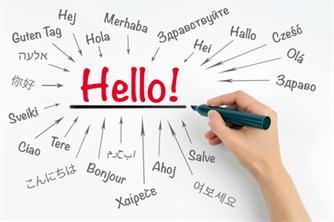 The issue of translation usefulness is something which crops up in all languages but more specifically and more obviously in English, the language which has become the lingua franca. Not communicating in English is like cutting oneself off from the world. As a result, society translates more and more material. In fact, it translates everything, and sometimes anything and in any old way too.
The issue of translation usefulness is something which crops up in all languages but more specifically and more obviously in English, the language which has become the lingua franca. Not communicating in English is like cutting oneself off from the world. As a result, society translates more and more material. In fact, it translates everything, and sometimes anything and in any old way too.
English, unlike other languages, is used so much that the data gathered by machines, such as Google Translate, is much more effective than it is for other languages.
Free automatic translation, which gives us the opportunity to get the gist of numerous documents at no cost, has yet to improve the image of the translation industry because some people use it to carry out word-for-word translations (e.g. poulet de loué = rented chicken!) without knowing that they’re making people laugh, making mistakes or that their translation is complete gobbledygook.
It is disastrous to proceed in this way: just because a text is made up of English words doesn’t mean it can be read or be understood by a native English speaker.
The crux of the matter lies in: Why is it being translated?
For whom is it being translated? There are three examples which we are now going to focus on and discuss.
1. When a text needs translating into English but the translation will serve no purpose, it’s a bit like having a vase of artificial flowers: there’s no point taking care of it. The translation only gives the impression that you are an international company like the flowers which add colour and cheerfulness, and after all, that might be enough to create an illusion. In such cases, there’s no point using a professional.
2. When the literary quality, finesse and nuances of the text are of no significance; when the translation doesn’t have a lot riding on it, is merely intended as a communication tool, to broach a subject as a whole but still needs to be understandable; in such cases, a machine translation will – once post edited – fulfil this role. It can even fulfil this role well if a good job is done of the post-editing. This rings especially true for technical texts (nuts and bolts and washers present few pitfalls)
3. However, in all other instances: editorial texts, legal and financial documents, websites, printed documents, and so on, translating without pouring one’s heart and soul into it, without looking for the right word, is counterproductive. Legal texts are full of subtleties and culture-specific issues. Editorial texts must be a joy to read, arouse the reader’s interest and be “localised”, in other words in keeping with the culture context of the language to have an impact. In addition to generating clicks and leads, websites need to generate trust too. Printed documents form part of a company’s image which lasts and if it is bad…
As a result, it’s important to know the reason for the translation as well as the intended audience.
Criterion 1: The register of the language and phraseology differ depending on the intended audience. A speech is not translated in the same way as a written document. A politician’s speech is not translated in the same way as a sports personality’s speech. A user manual is not translated in the same way as an advertisement. Not only is the “technical” skill different, but so too is the stylistic skill.
Criterion 2: the reliability of the translator. What use is it receiving an excellent translation if the deadline for the call for tender has passed or if the printer cannot get the work done in a timely manner?
To carry out a “useful” translation, all of these parameters must be taken into account. A single person cannot translate everything on their own, even if they are translating into their mother tongue.
Translators should be selected depending on:
- The purpose of the translation
- The deadline of the translation
- The technical skill of the translator
- The translator’s quality of writing
It would be silly to go to the market in evening dress and ill-advised to meet the Queen in flip flops
Useful translations are adapted to the context and the relationship between cost and what is at stake is just right.
The task of any translation company worth its salt is to guide you so that your translation is useful to you.


